The Engaged Scholar Spring 2023
Celebrating 30 Years
The Center for Civic Engagement (CCE) is celebrating its 30th anniversary in the upcoming year! As we continue to evolve alongside our community partners, faculty, and students, we remain true to our mission and values to advance the land-grant mission of the university, fostering meaningful connections and engagement between campus and communities to effect positive change in society. Throughout the spring semester, the CCE collaborated with 37 faculty to facilitate service-learning for 1353 students in 41 classes across the Pullman, Global, Tri-Cities, and Vancouver campuses!
We invite you to learn, celebrate, and reflect on community engagement, student success, reciprocal partnerships, and stronger communities happening across the WSU system at the 2023 WSU Community Engagement Summit on Tuesday, May 2, 2023, from 1-3 p.m. Please register for the summit in advance to join us.
Ben Calabretta, director
Jessica Perone, faculty consultant
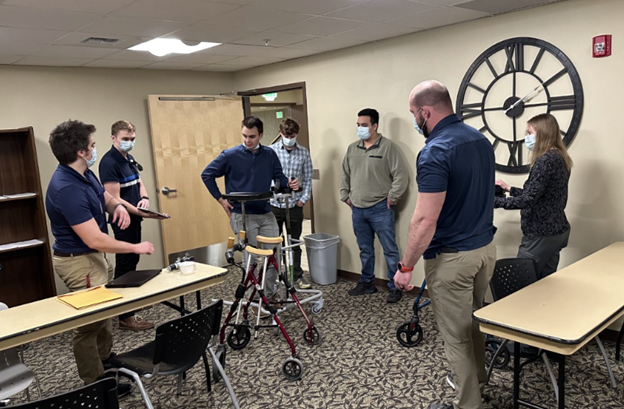
A team of WSU senior mechanical engineering students discusses a prototype for an adjustable walker with physical therapists from Whitman Hospital.
Innovative Partnerships
WSU Students Take Invention to Next Level through Service Learning
A design team of mechanical engineering students at WSU recently improved the functionality of a walker for individuals with mobility limitations. The students also designed an app to help a user communicate their needs more efficiently. Ananth Jillepalli and a small team of students in Software Design Project I & II also designed an app that encourages movement.
The walker improvements were made possible by Emily Larsen, Chuck Pezeshki, a team of students in the Mechanical Systems Design course (ME 416), Council on Aging & Human Services, and Mr. Dan Moore.
A Special Education teacher from St. John-Endicott Middle School and the Whitman Hospital and Medical Center (WHMC) Therapy Services Department also contributed their expertise to this project. The new walker will be donated to WHMC Therapy Services.
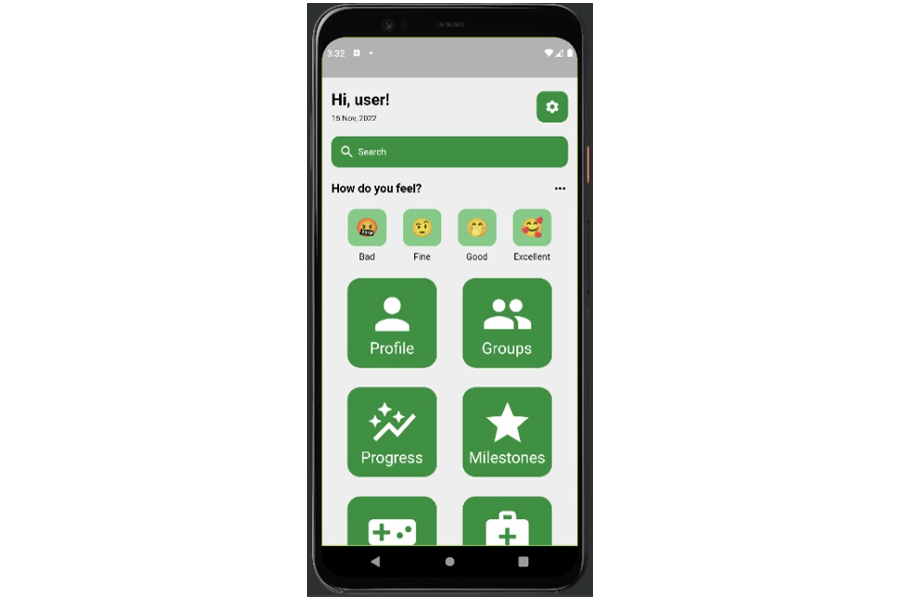
Example of the app designed by the Software Design Project 1 & 11 courses.
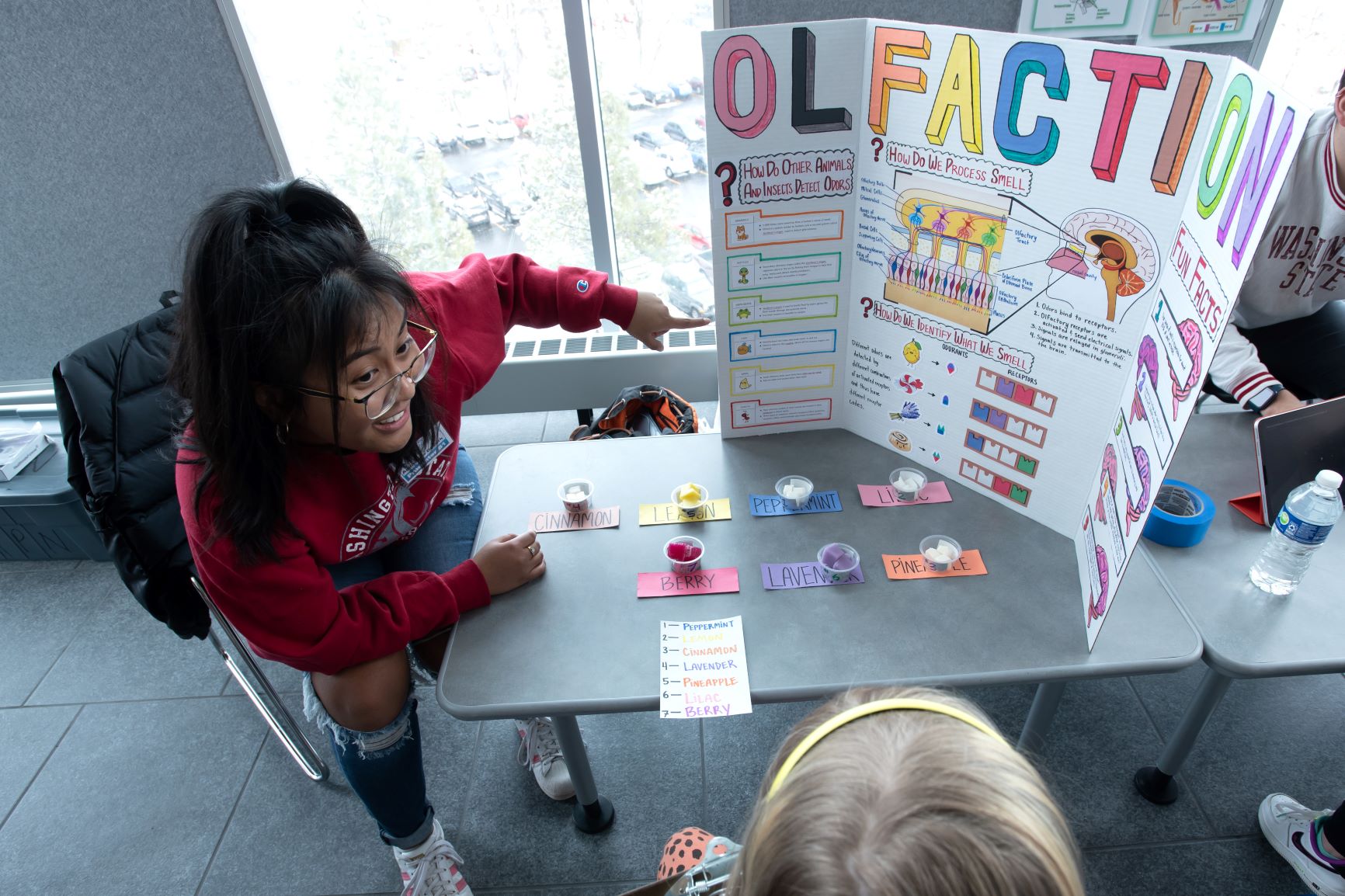
30 students from NEUROSCI 490 welcomed elementary school classes to the WSU Pullman campus for the KidsJudge! Neuroscience Fair.
WSU Students Welcome Elementary School Students to Neuroscience Fair
Samantha Gizerian, Associate Professor of Integrative Physiology & Neuroscience in the College of Veterinary Medicine, and 30 students in NEUROSCI 490 welcomed four elementary school classes to the KidsJudge! Neuroscience Fair on campus. This is a “reverse” science fair that is designed to educate kids about Neuroscience and health in a fun and engaging manner. Elementary students from Jefferson Elementary School, Pullman Christian School, and both elementary schools in the Gar-Pal school district visited the Pullman campus to participate in the fair and act as the “judges” of the WSU students' projects.
The goals of this event are two-fold. The first goal is to combat the negative stereotypes of science (“boring”, “difficult”) and scientists (“old white men”, “nerdy”, “anti-social”) that children are most commonly exposed to in media and in their daily lives. To demonstrate that science can be fun and as easy to learn as a game, while scientists come in all human shapes, sizes, colors, and personalities. The second goal is to improve the professional communication skills of the neuroscience student presenters. If they can explain their project to a 5th grader, they can explain it to anyone.
“Although I had expected to enjoy it, I was surprised by how much I was inspired by the children and how creative and innovative their approaches to our exhibit were. Also, I really enjoyed how they were able to speak their minds with no filters. I now know that working with children is incredibly fun and illuminating!” – NEUROSCI 490 Student
“It was really challenging to describe such complex topics in a way that fifth graders could easily understand. However, it was extremely beneficial to be able to simplistically explain a topic because most of us will need to be able to do so when conversing with others outside of the neuroscience field.” – NEUROSCI 490 Student
“I feel Kids Judge made me better at communicating science to a population with a non-science background because it really made me think of ways I could be creative to communicate complex biological processes that are not very easily understood by someone without prior basic knowledge in the field (i.e. neurons, chemical synapse, action potentials).” – NEUROSCI 490 Student
“What I liked about this project is that we got the freedom to pick what our stations looked like and what activities we did with the kids. This allowed us to use our creativity and talk about a neuroscience topic that was interesting to us. This made the experience more fun because I found my topic interesting and relevant to my current coursework.” – NEUROSCI 490 Student
Transformative Student Experiences
Students develop their academic, personal, and professional skills through community engagement and critical reflection in Compassion in Action: Introduction to Community Engagement (HONORS 211) and Immersive and Active Community Engagement (HONORS 212) taught by Jessica Perone, CCE Faculty Consultant. These courses fulfill the Community Engagement requirements for students working towards the Mindfulness-based Emotional and Social Intelligence (MESI) certificate program in the HONORS College.
Molly, a 4th-year student in Honors 211, participated in service projects at the Cougar Food Pantry and with Letters to Foster Children. She stated, “I see endless benefits of participating in community work, not only for the communities you’re giving back to, but for personal reasons as well. After participating in community engagement, I feel fulfilled. It helps hone so many personal qualities like leadership, communication, and compassion. I’m constantly trying to continue my self-improvement and community engagement is a great way to do that, especially with developing compassion. I think of compassion as one step further than empathy. Because of my service-learning, I am more emotionally and socially intelligent and an overall more compassionate and happier individual.”
Jacob, a second-year student in HONORS 212, engaged in over 60 hours of community service after this spring semester in just two years at WSU. Jacob has participated in CCE’s Public Square events and service-learning projects at Bishop Place, Circles of Caring, Regional Theater of the Palouse, and Inland Oasis. Jacob stated, “Self-compassion is important for volunteers to practice. We need to recognize that we cannot easily fix the injustice that we see in the community; even the notion that we are there to 'fix' anything can be problematic. We can do our best to make it a more equitable place and need to not beat ourselves up when we are unable to make an unfortunate situation a better one.”
Courses with a service-learning component provide an engaged and active learning experience which can lead to persistence and retention (Bringle et al., 2010). The increased sense of social responsibility, greater intercultural understanding, and a deeper understanding of compassion, empathy, and self-awareness allow WSU students to be active and socially aware members of communities around the globe.
Leadership & Global Service-Learning
Together for over 20 years, the WSU Global campus and CCE have been collaborating to prepare our next generation of community members to be socially responsible and committed to taking action towards positive change. Kiki Hibner is a senior majoring in Human Development. This spring, Kiki was in the HD 403 Global class, Families in Poverty taught by Mary Garcia. Kiki participated in service-learning projects with Second Harvest. Kiki stated, “I was able to get a better understanding of the experience of people living in poverty and needing help obtaining enough food for their household.” Kiki stated this experience affirmed her decision to major in Human Development and her goals as a future professional in the field.
Fifty-two students in the global class, Violence Towards Women (CRIM_J 403 and WGGS 403) taught by Leah Reddy participated in over 280 hours of service-learning projects this spring semester! Many students in the course chose to engage in meaningful projects with Full Life Care, Brighten A Day Foundation, Letters to Foster Children, Camp Korey, Crisis Text Line, and Clark County Volunteer Lawyers Program. Service-learning as a component of online classes is an important strategy to connect students to global civic issues, cultivate a deeper understanding of course material, improve retention, and prepare students for active citizenship post-graduation. The more positive and intentional connections that students can create with their communities, wherever they are geographically, the more positive the experience with the institution will be, leading to higher rates of retention, sense of purpose and persistence (Simonet, 2008). Students have the opportunity to gain a deeper sense of civic and social agency and reflect on their contributions as active global citizens.
Connecting with Community Partners
We have recently updated and improved the Community Partner Resources webpage! If you haven't recently visited, you can find helpful information about what it looks like to partner with the CCE, how to recruit student volunteers with GivePulse, best practices for managing students, more information about connecting classrooms to communities, and much more. It is our continual goal to be transparent and provide our partners and prospective partnering organizations with as much information and resources as possible. We hope this new webpage will be one of the many ways we do that.
Top Ten Organizations WSU Student Volunteered with during the 2023 Spring Semester
- White Spring Ranch Museum and Archive Library – 1995 Hours
- Letters to Foster Children – 323 Hours
- Community Action Center – 230 Hours
- Vitalant – 225 Hours
- City of Pullman Recreation Division – 101 Hours
- Full Life Care – 81 Hours
- City of Vancouver Volunteer Programs – 81 Hours
- Council on Aging & Human Services – 59 Hours
- Crisis Text Line – 54 Hours
- Palouse Conservation District – 51 Hours
Congratulations to the Awardees
Congratulations to multiple CCE graduate and undergraduate staff who won prestigious awards this semester.
- Keilah Shaw, academic programs graduate assistant; 2023 ALL IN Student Voting Honor Roll
- Brandon Cockburn, community programs graduate assistant; President’s Award for Leadership
- Sofia Aronovsky, peer mentor; President’s Award for Leadership
- Dylan Harbo, community partner assistant; Top 10 Senior Award for Community Service
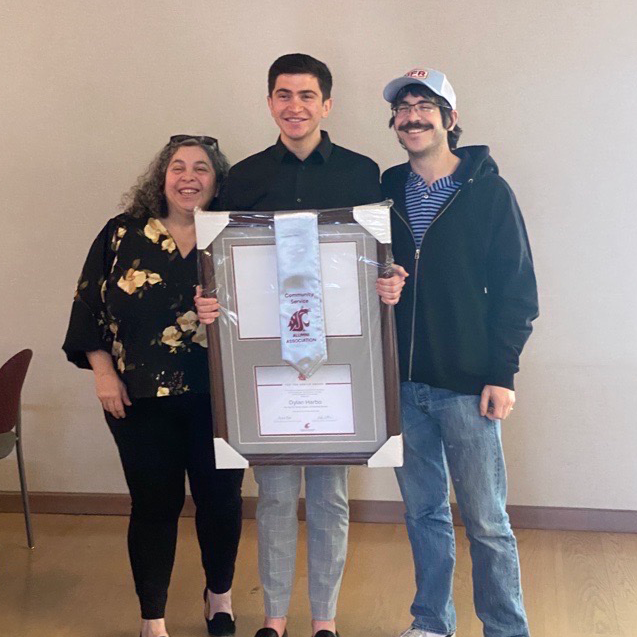
Dylan Harbo, community partner assistant, receives Top 10 Senior Award for Community Service.
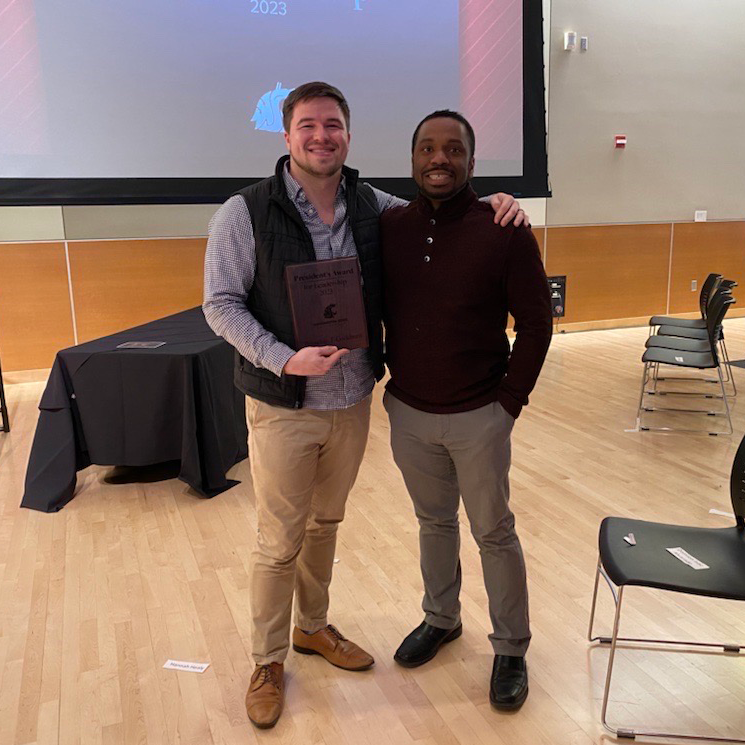
Brandon Cockburn, CCE graduate assistant, receives President's Award for Leadership.
Congratulations to the three community partners who received a President's Award for Leadership.
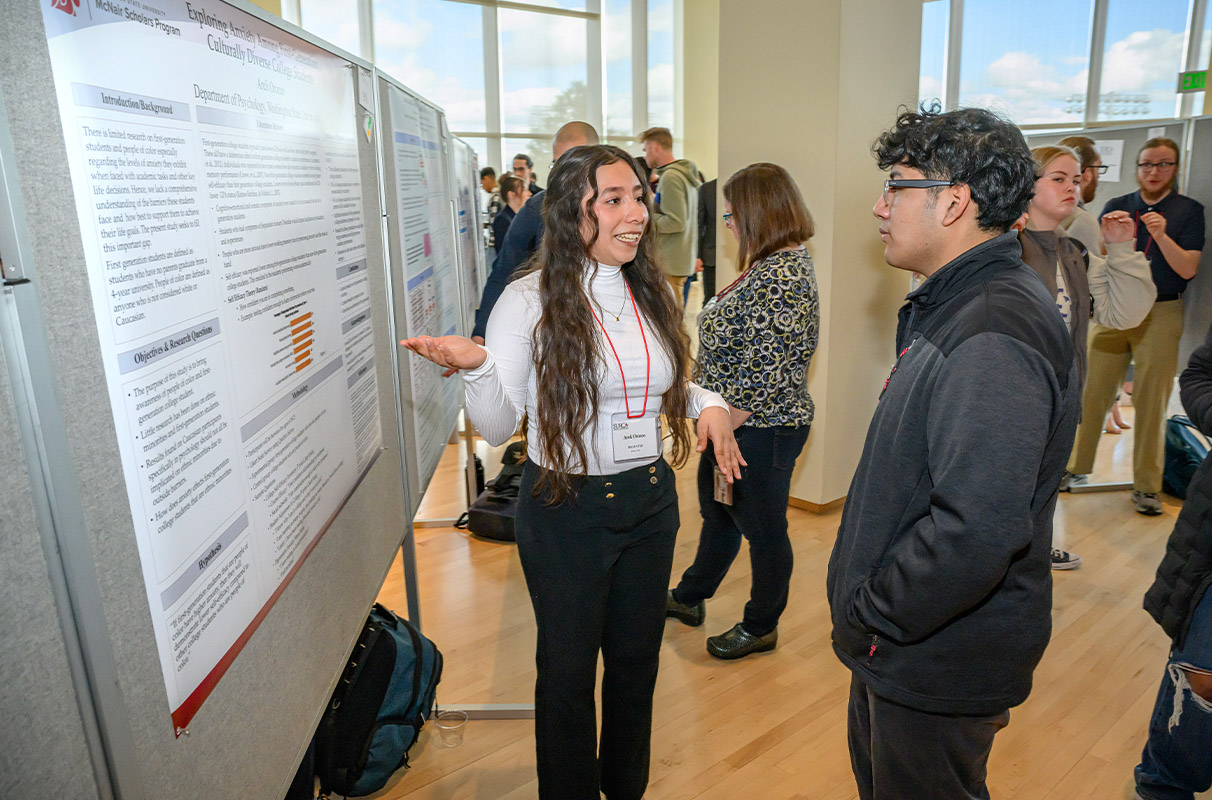
McNair scholar Areli Orozco presents at SURCA. Photo by Bob Hubner, WSU Photo Services.
WSU Pullman Student Receives Governor’s Award for Civic Engagement
McNair scholar Areli Orozco is the recipient of a Governor’s Student Civic Leadership award from the Washington Campus Coalition for the Public Good (WCC). The award highlights student leaders for their work in civic engagement, community leadership, and social entrepreneurship.
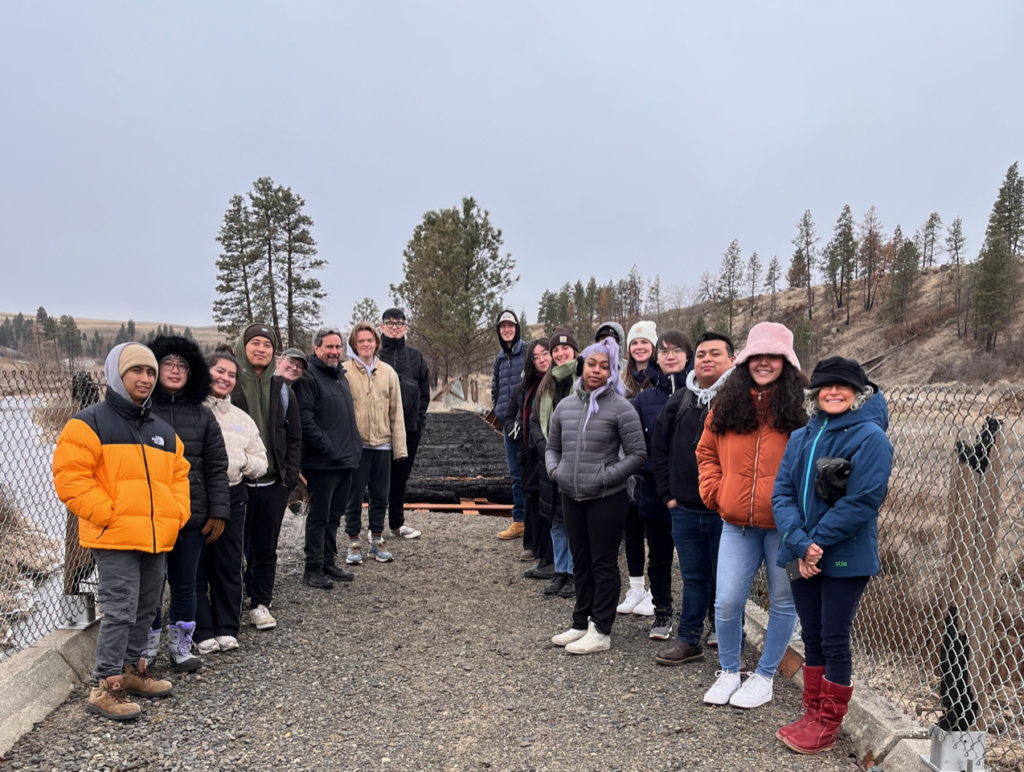
Students witness a burned bridge on the Palouse to Cascades Trail near Malden, WA.
Engagement News
- Hundreds of WSU Students Connect with Palouse Kids as Pen Friends
- Students in Electrical Engineering and Computer Science Senior Design capstone courses present their work at the EECS Senior Poster Design Competition on April 20 in the CUB Junior Ballroom.
- Landscape architecture students present restoration ideas for communities destroyed by 2020 fire
- All past issues of the Engaged Scholar Newsletter
- March 2023 Campus Connection Newsletter
Community Engaged Research Journal Invites Submissions
Journal of Community Engagement and Scholarship (JCES) invites the submission of manuscripts that relate to its mission: To provide a mechanism through which faculty, staff, and students of academic institutions and their community partners may disseminate scholarly works from all academic disciplines.
References
- Bringle, Robert G., et al. "The role of service-learning on the retention of first-year students to second year." Michigan Journal of Community Service Learning, vol. 16, no. 2, spring 2010, pp. 38+.
- Simonet, D. (2008) Service Learning and Academic Success: The Links to Retention Research. Minnesota Campus Compact.